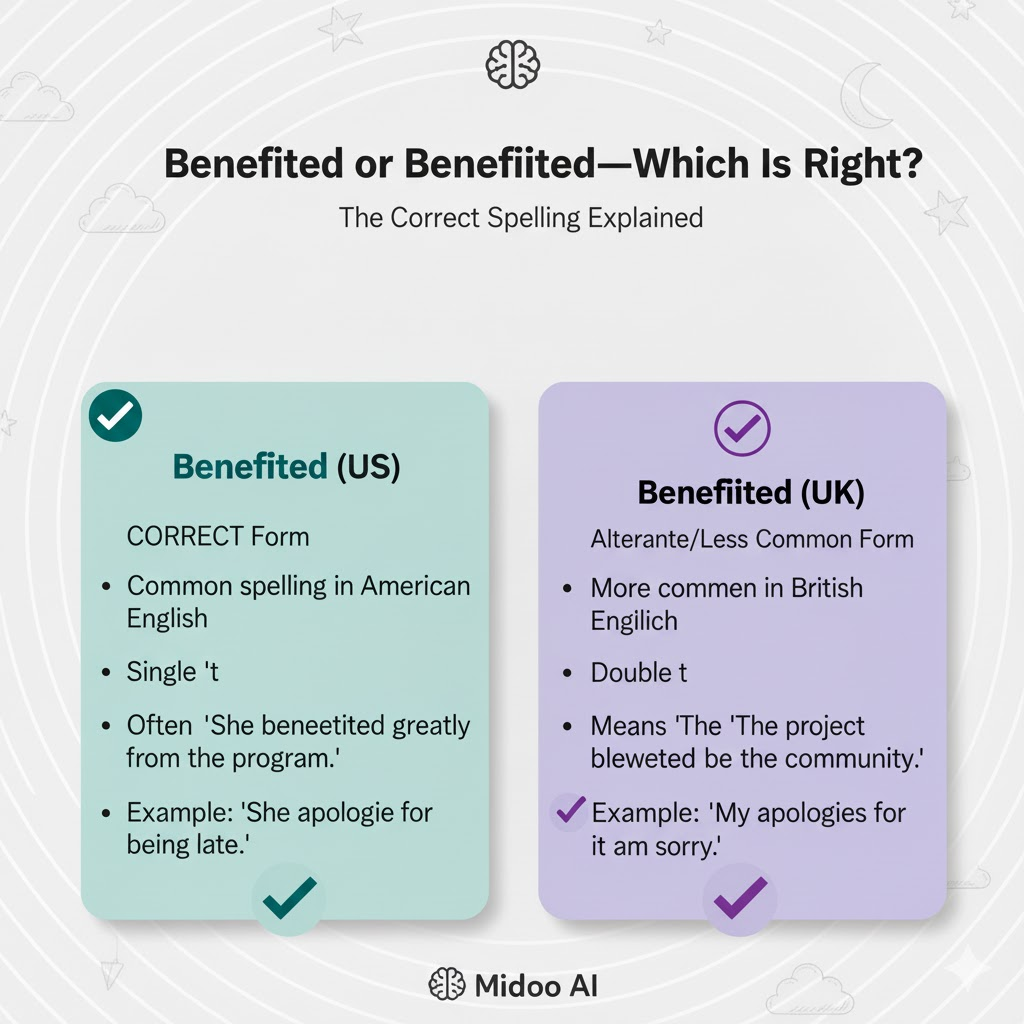Benefited or Benefitted—Which Is Right?

If you’ve ever written “benefited” and then paused, wondering whether it should have one t or two, you’re definitely not alone. English spelling can be full of traps like this—especially when British and American English don’t agree.
At Midoo AI, we help English learners master these tricky distinctions through real-world examples and smart grammar tips. So today, let’s settle the debate once and for all: should you write benefited or benefitted?
1. The Short Answer
✅ Benefited (with one “t”) is the correct spelling in American English and the preferred form internationally.
🇬🇧 Benefitted (with two “t”s) is occasionally used in British English, but even there, “benefited” is becoming more common.
So, while both forms are technically accepted in some places, “benefited” is the safer and more widely used spelling.
2. Understanding the Rule
The confusion comes from how English doubles consonants when adding endings like -ed or -ing.
Normally, verbs that end in a stressed short vowel + consonant double the consonant before adding “-ed.”
For example:
- plan → planned
- stop → stopped
But in “benefit,” the stress is on the first syllable (BE-ne-fit), not the second. That means we don’t double the t when forming the past tense.
So:
benefit → benefited (✅ correct)
benefit → benefitted (❌ usually incorrect)
3. Examples of “Benefited” in Sentences
✅ Correct (American & International English):
- She benefited greatly from the new training program.
- The community benefited from the charity event.
- Everyone benefited from his thoughtful advice.
- I truly benefited from studying with Midoo AI.
These examples sound natural and are used in both American and most modern British writing.
4. When “Benefitted” Appears (Mostly in British English)
While benefited dominates globally, you might still spot benefitted in older or more traditional British texts.
🇬🇧 Examples (British English only):
- The company benefitted from government funding.
- Many students benefitted from the new scholarship policy.
Both sentences would still be perfectly fine written with benefited instead—and most modern style guides (including Oxford and Cambridge) now recommend using benefited for consistency.
5. Quick Comparison Table
| Region | Preferred Spelling | Example |
|---|---|---|
| United States | benefited | She benefited from the change. |
| United Kingdom | benefited (modern) / benefitted (older) | The village benefited from the new road. |
| Canada | benefited | Everyone benefited from the policy. |
| Australia | benefited | Students benefited from extra lessons. |
6. Example + Tip Section
Example 1:
✅ He benefited from years of experience.
❌ He benefitted from years of experience.
💡 Tip: Remember—if the stress is on the first syllable (like “benefit”), don’t double the last consonant when adding -ed or -ing.
Example 2:
✅ We all benefited from working as a team.
❌ We all benefitted from working as a team.
💡 Tip: In American English writing (emails, essays, reports), “benefitted” will usually be marked as a typo by spell checkers.
Example 3:
✅ Her health has benefited from regular exercise.
✅ Her health benefited greatly from yoga.
💡 Tip: “Benefited” can work in both simple past and present perfect tenses—no need to change spelling.
7. Grammar Breakdown
- Base form: benefit
- Past tense: benefited
- Past participle: benefited
- Present participle: benefiting
Yes—same rule for benefiting! You only use one “t.”
✅ I’m benefiting from this course.
❌ I’m benefitting from this course.
💡 Tip from Midoo AI: If you ever see “benefitted” or “benefitting,” you’re likely reading British English, and even there, many editors prefer the single “t” spelling for clarity.
8. Common Mistakes to Avoid
🚫 She has benefitted a lot from therapy.
✅ She has benefited a lot from therapy.
🚫 The project benefitted many people.
✅ The project benefited many people.
🚫 They were benefitting from government support.
✅ They were benefiting from government support.
💡 Quick Memory Hack:
If the stress is not on the last syllable → don’t double the last letter!
9. Real-Life Usage
You’ll see “benefited” used by nearly every major organization, publication, and academic source.
Examples:
- The United Nations report showed how communities benefited from clean energy projects.
- Students benefited from using AI-powered learning platforms like Midoo AI.
- Local businesses benefited from increased tourism.
- Many workers benefited from flexible hours during the pandemic.
10. FAQ
Q1: Is “benefitted” wrong?
Not technically—but it’s rare and considered outdated outside the U.K. Most modern writers stick with benefited.
Q2: Why does British English sometimes double the “t”?
It follows an older rule that sometimes doubles consonants even when stress isn’t on the final syllable—but this usage is fading fast.
Q3: What about “benefiting” vs. “benefitting”?
Same rule applies! ✅ Benefiting (one “t”) is preferred in both American and British English.
Q4: How can I remember which one to use?
If you’re ever unsure, choose benefited—it’s the standard in nearly all global contexts.
Q5: Does Midoo AI use “benefited” or “benefitted”?
At Midoo AI, we follow international English standards, which means benefited is always the right choice.